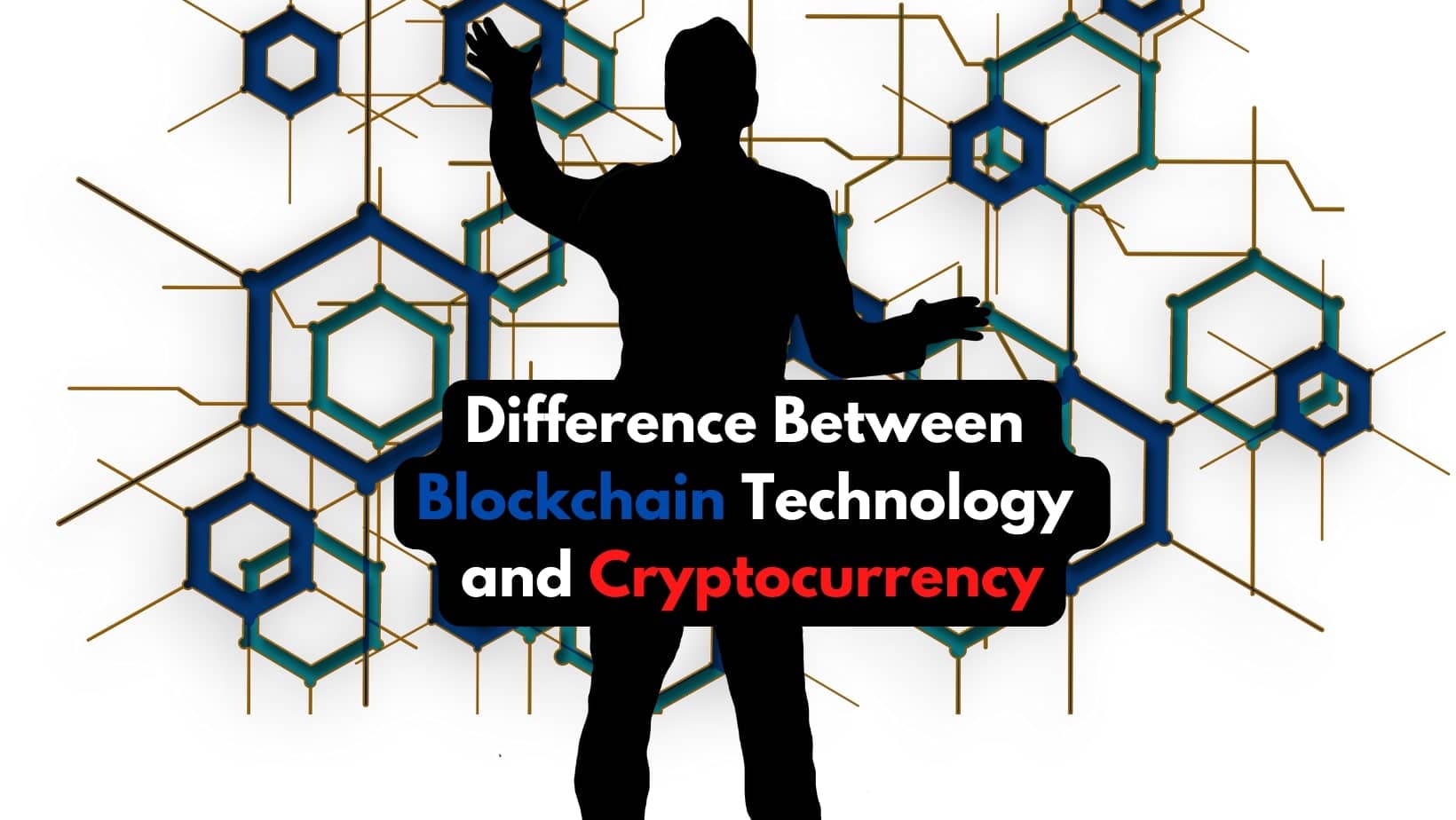You may have heard of Bitcoin and cryptocurrency, but what about blockchain technology? Blockchain is the underlying technology that enables Bitcoin and other cryptocurrencies to exist. In this article, we’ll see the difference between blockchain technology and cryptocurrency. And how it works.
We’ll also explore the benefits of blockchain technology in the future and how it can be used in business and other applications. Finally, we’ll take a look at some of the most popular cryptocurrencies and discuss why they are so popular.
What Is Blockchain?
You may have heard of Bitcoin, the most popular cryptocurrency in the world. But what you may not know is that Bitcoin is just one example of a blockchain-based currency.
So what is blockchain technology? Simply put, it’s a digital ledger that records all transactions made with cryptocurrencies. This ledger is decentralized, meaning it’s not controlled by any one person or institution. This makes it incredibly secure, as it’s virtually impossible to hack.
Blockchain technology is also transparent, meaning that anyone can see the transactions that have been made. This is one of the reasons why Bitcoin and other blockchain-based currencies are so popular: because people can trust them without having to rely on a central authority.
What Is Cryptocurrency?
You might have heard the term “cryptocurrency” floating around, but what does it actually mean? Cryptocurrency is a digital or virtual currency that uses cryptography to secure its transactions and control the creation of new units.
Bitcoin was the first cryptocurrency, and it still remains the most popular. But there are now over 1,000 different cryptocurrencies in circulation, each with its own unique features and purposes. So, how do you know which one is right for you? Where you can find platforms for cryptocurrency trading?
Well, that’s where blockchain technology comes in. Blockchain is the underlying technology that supports cryptocurrency. It’s a distributed database that allows for secure, transparent, and tamper-proof transactions. In other words, it’s what makes cryptocurrency possible.
The Difference Between Blockchain Technology and Cryptocurrency?
Here’s a side-by-side comparison of the differences between blockchain technology and cryptocurrency:
| Blockchain Technology | Cryptocurrency |
|---|---|
| Decentralized and transparent digital ledger | Digital or virtual form of currency |
| Records and verifies transactions | Enables peer-to-peer transactions |
| Used for various applications beyond cryptocurrencies | Primarily used for financial transactions |
| Provides secure and transparent data recording | Serves as a medium of exchange, store of value, or unit of account |
| Immutable and tamper-proof data storage | Utilizes cryptography for secure transactions |
| Enables decentralized transactions without intermediaries | Operates on a decentralized network |
| Wide range of industry applications (supply chain, healthcare, etc.) | Focuses on financial transactions and digital currencies |
| Technology infrastructure | Specific use case within blockchain technology |
| Many implementations and variations | Variety of cryptocurrencies available |
In summary, blockchain technology is a decentralized and transparent digital ledger used for various applications, while cryptocurrency is a digital currency that operates on blockchain technology, focusing primarily on financial transactions.
How Are Blockchain Technology and Cryptocurrency Connected?
Cryptocurrency and blockchain technology are closely connected, with cryptocurrency being one of the primary applications of blockchain technology. Here’s how they are interconnected:
- Underlying Technology: Cryptocurrencies operate on blockchain technology, which serves as the underlying infrastructure for recording and verifying transactions. Blockchain technology provides the decentralized, secure, and transparent framework necessary for cryptocurrencies to function.
- Transaction Verification: Cryptocurrencies rely on blockchain technology to validate and authenticate transactions. Transactions are recorded on the blockchain, forming a chain of blocks that cannot be altered or tampered with easily. The decentralized network of nodes ensures consensus and security in confirming the validity of transactions.
- Decentralization: Both cryptocurrency and blockchain technology emphasize decentralization. Cryptocurrencies eliminate the need for intermediaries like banks or financial institutions, enabling direct peer-to-peer transactions. Blockchain technology ensures decentralization by distributing transaction records across multiple nodes, making it resistant to censorship or control by a single entity.
- Security and Trust: Cryptocurrencies utilize cryptographic techniques within the blockchain to secure transactions and control the creation of new units. Cryptographic encryption ensures the integrity and security of transactions, making it difficult for unauthorized parties to manipulate or counterfeit the currency. Blockchain technology, with its decentralized and immutable nature, provides a high level of trust and security for cryptocurrency transactions.
- Innovation and Advancements: The development and growth of cryptocurrencies have driven advancements and innovations in blockchain technology. The need for scalability, privacy, and efficiency in cryptocurrency transactions has led to the exploration of new blockchain protocols and technologies, such as Ethereum and its smart contract capabilities.
- Diverse Applications: Blockchain technology extends beyond cryptocurrencies, finding use in supply chain management, healthcare records, voting systems, decentralized applications, and more. Cryptocurrencies remain a prominent and recognized use case.
Advantages and Disadvantages of Cryptocurrency
Cryptocurrencies have a number of advantages and disadvantages. Let’s take a look at some of each.
Advantages of Cryptocurrency:
- Decentralized: Cryptocurrencies are not subject to government or financial institution control. This can be seen as an advantage by some, as it gives power back to the people.
- Secure: Cryptocurrency transactions are encrypted, so they are secure.
- Private: Cryptocurrency transactions are private, so you don’t have to worry about your personal information being shared.
- Anonymous: You can remain anonymous when using cryptocurrencies, so you don’t have to worry about your identity being stolen.
Disadvantages of Cryptocurrency:
- Volatile: The value of cryptocurrencies is volatile, so they can go up or down in value quickly and unexpectedly. This can make them risky to invest in.
- No physical form: Cryptocurrencies are purely digital, so they can be difficult to wrap your head around if you’re used to physical currency.
- Not widely accepted: Cryptocurrencies are not yet widely accepted, so you may not be able to use them in all situations.
Advantages and Disadvantages of Blockchain Technology
Blockchain technology has a number of advantages and disadvantages. Let’s take a look at some of each.
Advantages of Blockchain Technology
- Decentralization: Blockchain operates on a decentralized network, eliminating the need for intermediaries and providing greater transparency and control.
- Security: Transactions recorded on the blockchain are highly secure due to cryptographic encryption and the distributed nature of the network.
- Transparency: The transparent nature of blockchain enables all participants to view and verify transactions, promoting trust and accountability.
- Immutability: Once data is recorded on the blockchain, it is difficult to alter or tamper with, ensuring the integrity and reliability of the information.
- Efficiency: Blockchain automates processes, reduces paperwork, and streamlines transactions, leading to increased efficiency and cost savings.
- Traceability: Blockchain allows for the traceability of assets, products, and transactions, providing a reliable audit trail.
Disadvantages of Blockchain Technology
- Scalability: Blockchain’s distributed nature can result in slower transaction speeds and limited scalability compared to centralized systems.
- Energy Consumption: Proof-of-Work (PoW) consensus algorithms used by some blockchains require significant computational power, leading to high energy consumption.
- Regulatory Challenges: The regulatory landscape surrounding blockchain technology and cryptocurrencies is still evolving, presenting legal and compliance challenges.
- Complexity: Understanding and implementing blockchain technology can be complex, requiring specialized knowledge and technical expertise.
- Data Privacy: While blockchain ensures transaction transparency, privacy concerns arise when sensitive or personal data is recorded on the blockchain.
- Costs: Setting up and maintaining a blockchain network can be costly, especially for private or enterprise blockchains.
It’s important to note that the advantages and disadvantages of blockchain technology can vary depending on the specific use case, blockchain implementation, and industry requirements.
Real-World Applications of Blockchain Technology and Cryptocurrency

Cryptocurrencies and blockchain technology are not just for buying and selling drugs or other illicit goods on the internet. In fact, there are a number of very legitimate uses for both.
For instance, blockchain technology is being used to create more secure digital identities. This is especially important in developing countries, where many people do not have a formal government-issued ID.
In addition, blockchain-based remittances are becoming increasingly popular. These are particularly useful in countries where there is political instability or the banking system is not well developed.
Finally, blockchain technology is also being used to create tamper-proof medical records. This is important because it can help to ensure that patient’s medical histories are accurately maintained and that their privacy is protected.
Security Considerations With Blockchain Technology and Cryptocurrency
When it comes to security, there are a few things you need to keep in mind with blockchain technology and cryptocurrency.
First, because blockchain is decentralized, there is no one central authority overseeing things. This lack of centralization can make it more difficult to track down hackers or investigate security breaches.
Second, blockchain is immutable, meaning that once something is written to the blockchain, it cannot be changed. This is great for security in terms of data integrity, but it also means that if you make a mistake, there’s no way to go back and fix it.
Finally, cryptocurrency exchange platforms are often unregulated, which means that there may be no protection if the platform is hacked or if you lose your coins.
So what does all this mean for you? Basically, you need to be extra careful when dealing with blockchain and cryptocurrency. Make sure you do your research and only use reputable platforms. And never store more coins than you can afford to lose.
Challenges With Adopting Blockchain Technology and Cryptocurrency
There are, of course, challenges that come with adopting blockchain technology and cryptocurrency.
For one, it can be difficult to keep up with the ever-changing landscape of regulation. Governments are still trying to figure out how to tax cryptocurrency, and some have outright banned it. This creates a lot of uncertainty for businesses that want to get involved with blockchain technology and cryptocurrency.
Another challenge is that blockchain technology and cryptocurrency are still relatively new technologies, which means there aren’t a lot of people with the skills and knowledge necessary to develop and implement them. This shortage of talent can make it difficult and expensive to find the right people for the job.
Last but not least, there’s the question of security. Cryptocurrency exchanges have been hacked in the past, and there’s always the risk that more sophisticated attacks could target businesses that adopt blockchain technology.
Conclusion
In conclusion, while blockchain technology and cryptocurrency are interconnected, they represent distinct concepts. Blockchain technology is the decentralized and transparent digital ledger that enables secure and transparent transactions, while cryptocurrency is a specific use case of blockchain technology, representing digital or virtual currencies. Understanding the differences between these concepts is crucial for grasping the potential and impact of blockchain technology in various industries. By harnessing the power of blockchain technology, we can unlock new opportunities and transform traditional systems, paving the way for a more secure, transparent, and decentralized future.










